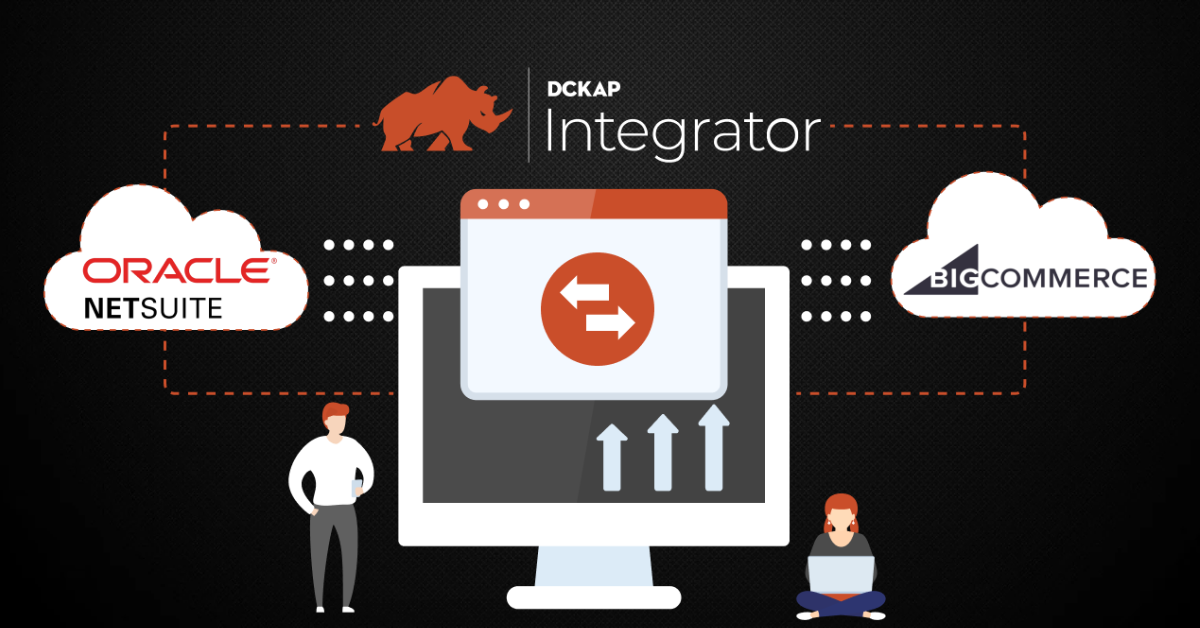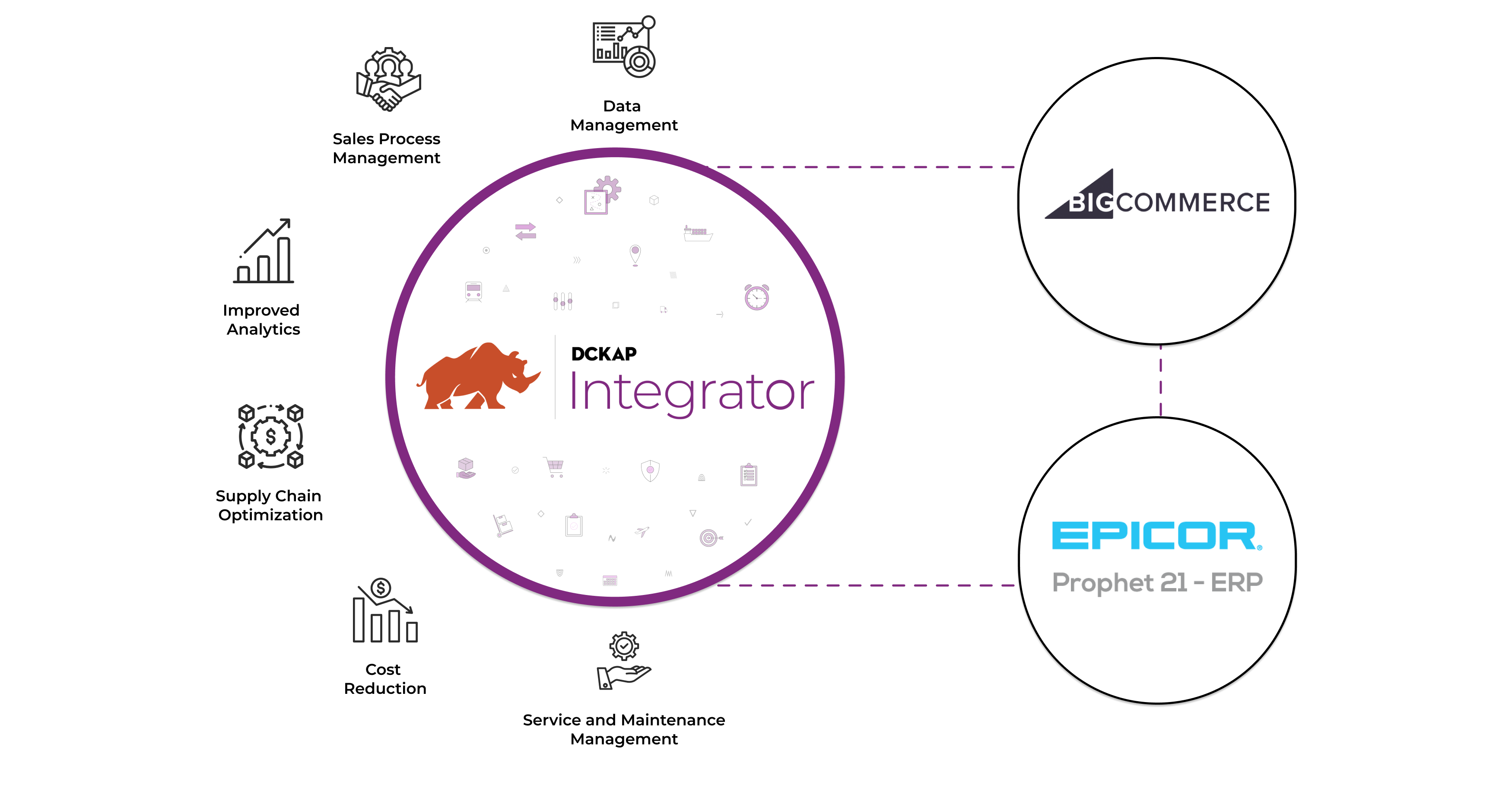BigCommerce integration means connecting your front-end eCommerce store with back-end applications such as customer relationship management (CRM), enterprise resource planning (ERP), EDI (electronic data interchange), and accounting software. Successful integrations ensure seamless data transfers between the applications and automation of business processes.
The Top BigCommerce Integrations and Use Cases
Here’s a quick look at some of the must-have integrations that can significantly impact your business operations:
- ERP Integration
- CRM Integration
- Shipping/Logistics Platform Integration
- Multi-channel Inventory Management Integration
- Custom Integration
1. ERP Integration
An ERP system acts as a centralized platform for key business processes across the organization including human resources (HR), inventory management, manufacturing, accounting, finance, and others. From managing orders to handling customer information, ERP is the primary hub that facilitates numerous business operations.
Some of the common BigCommerce ERP integration include Acumatica, Brightpearl, Oracle NetSuite, Microsoft Dynamics 365, and SAP Business.
Use cases
- Centralized data: ERP BigCommerce integration eliminates data silos and brings together all relevant data into a single, unified platform, enabling business intelligence to pull real-time data for actionable insights.
- Process automation: Automated data transfers eliminate the need for human intervention. Undoubtedly, automation improves workflows—be it processing purchase orders or real-time inventory updates on item availability, improving the responsiveness of sales and marketing teams.
- Personalized customer experiences: Integrating BigCommerce and ERP helps consolidate real-time customer data at a central location, enabling companies to deliver omnichannel experiences which have become the Northstar of customer experiences.
Read more: ERP Integration with BigCommerce Explained [+Steps]
2. CRM Integration
A robust BigCommerce CRM integration can help ecommerce businesses track customer data more effectively. It can help improve customer engagement, enhance customer service, and ultimately, boost retention rates.
Some examples of the popular CRM platforms for integration include Zoho CRM, Hubspot, Salesforce CRM, EngageBay CRM, Microsoft Dynamics CRM, etc.
Use Cases
- Strengthened marketing campaigns: When you know your customers, you are better equipped to service them. If you notice a surge in demand for a product during a particular season, you can run targeted email campaigns during that time, or you can promote relevant products to customers based on their preferences, and behavior.
- Improved planning and forecasting: With a 360-degree view of your customers, their purchase history, payment methods, and buying patterns, you can make informed decisions about which products to stock up and which ones to discontinue. Additionally, combining inventory and sales forecast data can also help you predict and manage inventory levels.
- Enhanced customer service: You can directly engage with your customers through their preferred channels such as email, SMS, social media, etc. directly from the CRM. Additionally, all the interactions and the related metadata can be stored at and accessed from a single location, providing a comprehensive view to your team. This means they are fully able to understand the context and predict customer needs.
Read more: CRM Data Integration: How It Works With Other Systems
3. Shipping/Logistics Platform Integration
When BigCommerce integrates with your 3PL (third-party logistics) provider, it helps streamline the various processes in shipping management from order to delivery, minimizes errors, and improves visibility into the order status.
A few of the logistics platforms for BigCommerce include XPO Logistics, Shippo, ShipperHQ, Easyship, and ShipStation.
Use Cases
- Broader reach: Integration with 3PL enables businesses to reach a global distribution network. This helps to deliver store products to customers worldwide, reducing shipping times and costs, and also increasing market expansion.
- Scalability: Your business is better equipped to handle fluctuating demand, offering the flexibility to scale operations up or down as needed. This enables you to handle peak seasons without compromising on efficiency or customer service.
- Enhanced customer satisfaction: Integration allows faster delivery times and professional order fulfillment processes. When coupled with real-time order tracking, you can significantly improve the customer experience, encouraging repeat business and loyalty.
Related read: Epicor Shipping & Receiving Guide for Distributors
4. Multi-channel Inventory Management Integration
eCommerce players may face complexity when selling through various sales channels and marketplaces, such as Amazon, eBay, or social media platforms. In such a diverse selling environment, it is crucial to maintain real-time inventory updates.
Some of the common inventory management platforms include Zoho Inventory, Ordoro, inFlow, Katana, and Fishbowl Inventory.
Use Cases
- Improved efficiency: Inventory management is the cornerstone of your e-commerce operations, affecting both the daily activities and business operations. When you can efficiently manage the movement of goods within your business and throughout the supply chain, you can gain essential insights.
- Better inventory control: A better oversight over your inventory enables you and your managers to identify the optimal times for restocking products, or to pinpoint which items are incurring losses.
Also see: ERP In Supply Chain Management: A Distributor’s Guide
5. Custom Integration
Your enterprise might utilize unique systems, like analytics tools, customer loyalty programs, or Product Information Management (PIM) software. These specialized solutions can be tailored to work in sync with other platforms as well as BigCommerce. However, integration efforts may vary.
What BigCommerce Integrations Mean for Your Business
Robust and well-deployed BigCommerce integrations can offer numerous benefits to your business—improved operational efficiency, superior customer experience, and multi-channel sales are too important to be ignored.
Enhanced Operations
Integrating BigCommerce with different enterprise applications including CRM, ERP, inventory management, etc. ensures automated, seamless data flow. This automation reduces manual errors, saves time, and improves operational efficiency.
Improved Efficiency
Manual operations are prone to errors and costly delays. However, with a completely integrated, automated system, the team members are less burdened and can focus on high-value tasks.
Reduced Data Redundancy and Errors
Inconsistent or poor-quality data can result in outdated information. This can lead to delayed response and poor customer experiences. With real-time data, teams are better equipped to avoid errors and make profitable decisions.
Superior Customer Experience
In today’s commercial landscape, customer expectations are changing—they demand convenient, hassle-free, and personalized experiences across different channels and touchpoints—robust BigCommerce integrations can offer that.
Methods of BigCommerce Integration
Here are three common ways of integrating BigCommerce with different applications.
Point-to-Point (P2P) Integration
It involves using custom codes to connect the BigCommerce store and the business applications of interest.
Pros:
- Addresses the custom or specific integration needs of your business
- Full control over the integration process
Cons:
- Necessitates a skilled and experienced development team
- Time-consuming
- Lack of end-to-end automation of processes
- The absence of a centralized place to monitor integration complicates troubleshooting
- Absence of a team member with knowledge of P2P integration during the project may impact the integration project
Native Integration
BigCommerce can be connected to applications using their APIs (application programming interfaces). Here is the list of different apps that can integrate with BigCommerce.
Pros:
- Integration might be part of the subscription without additional charges or at a minimal cost
- Application support teams could assist in building and maintaining integration
- Availability of pre-built connectors, templates, and workflows
Cons:
- Apps might not provide all the necessary integrations for your business
- Customization options in integration are limited, primarily catering to common scenarios
- Lack of end-to-end automation
Integration Platform as a Service (iPaaS)
A cloud-based third-party platform that provides a suite of tools and services designed to facilitate the integration of various software applications, data, and processes across multiple environments.
Pros:
- A single dashboard for a unified view of integrations
- Robust data protection, privacy, and security measures
- Scalable integrations with multiple applications, systems, data warehouses, databases, or data sources
- Flexible pricing structures based on defined features
Cons:
- May involve an initial learning curve
- Building integrations can take time due to complexities, legacy systems, disparate data, etc.
Learn more: Why Use An Integration Platform? [+ 10 Avoidable Risks]
Maximizing the Benefits of BigCommerce Integrations Using DCKAP Integrator
DCKAP Integrator is a market-leading, low-code iPaaS solution, distinguished for its capability to seamlessly connect various enterprise applications such as ecommerce platforms, ERP, CRM, EDI, PIM, databases, and other automation or marketing tools—whether in-cloud or on-premise. Specially designed for optimizing commerce operations for distributors, it automates key business workflows, streamlines data transfer, and minimizes toggling between different apps.
Here’s how DCKAP Integrator expedites BigCommerce integration:
Scalable Architecture
DCKAP Integrator’s scalable architecture ensures that as your business expands, integrating new systems and technologies is a straightforward process.
Data Synchronization
This iPaaS solution facilitates real-time, bidirectional data exchange across systems, eliminating the need for manual input and maintaining data accuracy.
Pre-Built Connectors and Custom Integrations
With an extensive library of pre-built connectors, DCKAP Integrator accelerates integrations. Additionally, its flexible flow designers allow for the easy creation of custom integrations.
Ease of Use
The platform’s low-code, drag-and-drop interface is user-friendly for both non-technical and business users.
Automated Scheduling
The platform provides the functionality to establish custom, automated schedules for data synchronization and batch processing, enhancing operational efficiency.
Advanced Logging
The platform offers advanced logging capabilities, enabling you to monitor data transfers and perform real-time troubleshooting.
Easy Data Mapping
DCKAP Integrator simplifies the data mapping process between data fields of the systems being integrated, allowing using business logic without the need for developers involvement.
Final Words
BigCommerce, a popular e-commerce storefront when seamlessly connected with essential back-end systems like CRM and ERP can transform your business growth. This successful integration streamlines data flow and business processes, enhancing efficiency and customer experience. With solutions like DCKAP Integrator, businesses can expect scalable architecture and real-time data synchronization, ensuring a smooth, efficient, and customer-friendly ecommerce operation.
To know more about how you can plan and execute BigCommerce integration to meet all your unique needs, get in touch with us today!
Contents




